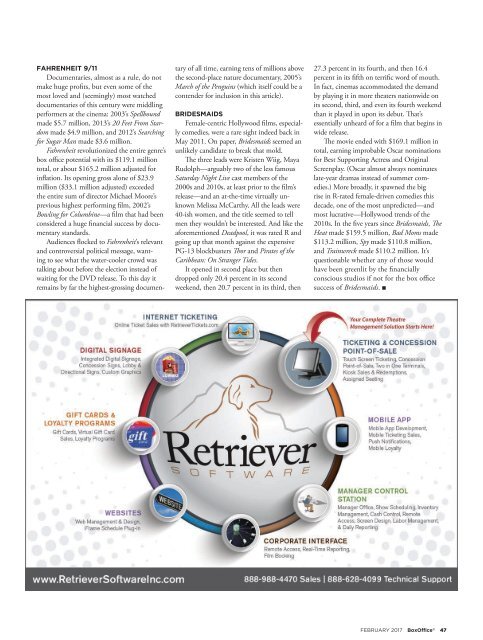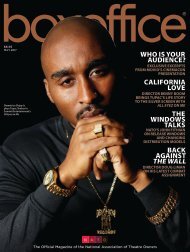Boxoffice - February 2017
The Official Magazine of the National Association of Theatre Owners
The Official Magazine of the National Association of Theatre Owners
Create successful ePaper yourself
Turn your PDF publications into a flip-book with our unique Google optimized e-Paper software.
FAHRENHEIT 9/11<br />
Documentaries, almost as a rule, do not<br />
make huge profits, but even some of the<br />
most loved and (seemingly) most watched<br />
documentaries of this century were middling<br />
performers at the cinema: 2003’s Spellbound<br />
made $5.7 million, 2013’s 20 Feet From Stardom<br />
made $4.9 million, and 2012’s Searching<br />
for Sugar Man made $3.6 million.<br />
Fahrenheit revolutionized the entire genre’s<br />
box office potential with its $119.1 million<br />
total, or about $165.2 million adjusted for<br />
inflation. Its opening gross alone of $23.9<br />
million ($33.1 million adjusted) exceeded<br />
the entire sum of director Michael Moore’s<br />
previous highest performing film, 2002’s<br />
Bowling for Columbine—a film that had been<br />
considered a huge financial success by documentary<br />
standards.<br />
Audiences flocked to Fahrenheit’s relevant<br />
and controversial political message, wanting<br />
to see what the water-cooler crowd was<br />
talking about before the election instead of<br />
waiting for the DVD release. To this day it<br />
remains by far the highest-grossing documentary<br />
of all time, earning tens of millions above<br />
the second-place nature documentary, 2005’s<br />
March of the Penguins (which itself could be a<br />
contender for inclusion in this article).<br />
BRIDESMAIDS<br />
Female-centric Hollywood films, especially<br />
comedies, were a rare sight indeed back in<br />
May 2011. On paper, Bridesmaids seemed an<br />
unlikely candidate to break that mold.<br />
The three leads were Kristen Wiig, Maya<br />
Rudolph—arguably two of the less famous<br />
Saturday Night Live cast members of the<br />
2000s and 2010s, at least prior to the film’s<br />
release—and an at-the-time virtually unknown<br />
Melissa McCarthy. All the leads were<br />
40-ish women, and the title seemed to tell<br />
men they wouldn’t be interested. And like the<br />
aforementioned Deadpool, it was rated R and<br />
going up that month against the expensive<br />
PG-13 blockbusters Thor and Pirates of the<br />
Caribbean: On Stranger Tides.<br />
It opened in second place but then<br />
dropped only 20.4 percent in its second<br />
weekend, then 20.7 percent in its third, then<br />
27.3 percent in its fourth, and then 16.4<br />
percent in its fifth on terrific word of mouth.<br />
In fact, cinemas accommodated the demand<br />
by playing it in more theaters nationwide on<br />
its second, third, and even its fourth weekend<br />
than it played in upon its debut. That’s<br />
essentially unheard of for a film that begins in<br />
wide release.<br />
The movie ended with $169.1 million in<br />
total, earning improbable Oscar nominations<br />
for Best Supporting Actress and Original<br />
Screenplay. (Oscar almost always nominates<br />
late-year dramas instead of summer comedies.)<br />
More broadly, it spawned the big<br />
rise in R-rated female-driven comedies this<br />
decade, one of the most unpredicted—and<br />
most lucrative—Hollywood trends of the<br />
2010s. In the five years since Bridesmaids, The<br />
Heat made $159.5 million, Bad Moms made<br />
$113.2 million, Spy made $110.8 million,<br />
and Trainwreck made $110.2 million. It’s<br />
questionable whether any of those would<br />
have been greenlit by the financially<br />
conscious studios if not for the box office<br />
success of Bridesmaids. n<br />
FEBRUARY <strong>2017</strong> BoxOffice ® 47
















